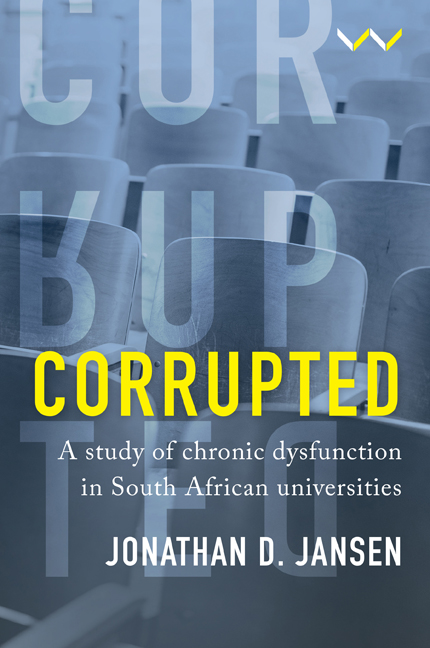Book contents
- Frontmatter
- Contents
- Acknowledgements
- Acronyms and Abbreviations
- Map: South African Universities
- Chapter 1 A Study of Chronic Dysfunction in Universities
- Chapter 2 Historical Roots of Dysfunction: Shaping the South African University
- Chapter 3 Dysfunctionality in Universities: A Political Economy Perspective
- Chapter 4 A Personal Journey Through the Political Economy of Universities
- Chapter 5 Casting Long Shadows: How History Shapes the Politics of Universities In South Africa
- Chapter 6 The University as a Concentrated and Exploitable Resource
- Chapter 7 The University as a Criminal Enterprise
- Chapter 8 The Micropolitics of Corruption in Universities
- Chapter 9 The Twin Roots of Chronic Dysfunctionality in Universities
- Chapter 10 Rethinking and Rebuilding Dysfunctional South African Universities
- Appendices
- Notes
- References
- Index
Chapter 9 - The Twin Roots of Chronic Dysfunctionality in Universities
Published online by Cambridge University Press: 29 November 2023
- Frontmatter
- Contents
- Acknowledgements
- Acronyms and Abbreviations
- Map: South African Universities
- Chapter 1 A Study of Chronic Dysfunction in Universities
- Chapter 2 Historical Roots of Dysfunction: Shaping the South African University
- Chapter 3 Dysfunctionality in Universities: A Political Economy Perspective
- Chapter 4 A Personal Journey Through the Political Economy of Universities
- Chapter 5 Casting Long Shadows: How History Shapes the Politics of Universities In South Africa
- Chapter 6 The University as a Concentrated and Exploitable Resource
- Chapter 7 The University as a Criminal Enterprise
- Chapter 8 The Micropolitics of Corruption in Universities
- Chapter 9 The Twin Roots of Chronic Dysfunctionality in Universities
- Chapter 10 Rethinking and Rebuilding Dysfunctional South African Universities
- Appendices
- Notes
- References
- Index
Summary
Nthabiseng Ogude was the talented new deputy vice-chancellor of a recently merged university on the east coast of South Africa, the Nelson Mandela Metropolitan University (NMMU). Its organisational core was the established white University of Port Elizabeth (UPE), which had merged with the Port Elizabeth Technikon and incorporated an urban black campus (Vista), together with a smaller campus in George about 350 kilometres away. All eyes were on this young professor of chemistry, one of the first black women to be appointed as a senior executive of a major university.
One evening, a petrol attendant put ordinary petrol in her car's diesel tank, sparking a small crisis. Ogude had to travel to George the next day to officiate at a graduation ceremony of NMMU's Southern Cape campus. She called the vice-chancellor's assistant, who hastily arranged a replacement car from the rental company used by the university for official business. The car was duly delivered, but out of an appreciation for the university's business, the rental company decided to deliver an A-class Mercedes-Benz sedan rather than the basic Toyota-level vehicle normally used for travel – without charging for the upgrade. The vicechancellor, a mild-mannered Christian who was ethical to a fault, was furious when he heard about this break with protocol. He confronted Ogude. Why did she take a rental car when the university gave her a generous car allowance? And why an A-class vehicle when university policy restricted staff to a smaller vehicle at the lower end of the rental car range? While the vice-chancellor had clearly not heard about Ogude's car travails, the message from the top of the university could not have been clearer: integrity mattered.
INSTITUTIONAL INTEGRITY
What happens in low-trust environments when those responsible for managing universities cannot trust one another to act with integrity? The consequence, in a nutshell, is dysfunction. But what is this thing called institutional integrity?
Whereas individual integrity is the practice of honesty and doing the right thing on the part of an individual person who shows consistency in adhering to the values that connect words and actions, institutional integrity refers to ‘an organization that defines and acts within a strong code of ethical conduct and positive values and that adopts no tolerance of attitudes, actions and activities by its employees or partners that deviate from that code’.
- Type
- Chapter
- Information
- CorruptedA Study of Chronic Dysfunction in South African Universities, pp. 195 - 222Publisher: Wits University PressPrint publication year: 2023



